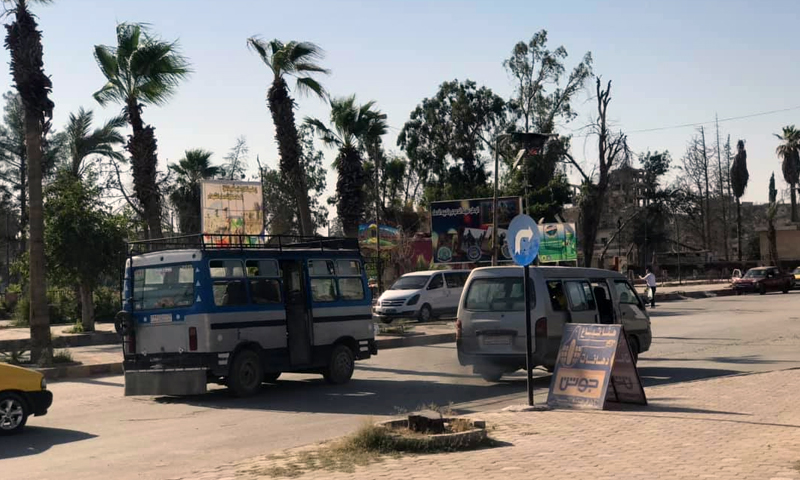Raqqa – Hussam al-Omar
Although the city of Raqqa has been outside of the Syrian regime’s control since mid-March 2013, some employees of the regime’s institutions are still obliged to travel miles to areas controlled by the regime in order to keep their job.
Tahseen, an employee in one of the regime’s institutions, has to be physically present every week on Tuesdays during the official working hours. His workplace is in the town of al-Sabkhah in the southeastern countryside of Raqqa, which has many Syrian regime-linked institutions. This town is considered the closest city under the control of the Assad regime to the city of Raqqa.
Challenges and obstacles
The employee, Tahseen, receives a monthly salary of 75,000 Syrian pounds(22.7 USD). However, he has to pay 15,000 pounds(4.5 USD)per week as transportation fees to make it to work. In other words, he has to spend 20 percent of his salary on transportation.
Tahseen fears if he does not show up for work, he will find himself on the regime’s wanted list.
In addition, he faces many dangers and obstacles at the checkpoints operated by different armed groups, principally the Syrian government and the Syrian Democratic Forces(SDF), Tahseen said.
The Syrian regime forces, backed by Iranian militias, retook control of the towns of al-Sabkhah and Madan in the southeastern countryside of Raqqa in 2017 after the Islamic State (IS) withdrew its fighters towards areas in Deir Ezzor countryside.
Early retirement in exchange for bribes
An employee of the regime’s institutions paid 100,000 Syrian pounds (30 USD) as a bribe to one of the institution’s officials in the city of al-Sabkha, in exchange for his early retirement on the pretext of having a degenerative disk disease.
Withholding his name for security reasons, the employee said that the salaries provided by the Syrian government do not even cover transportation fees to and from work.
The employee added that many government employees are left with two options; either to quit their job and face the risk of being prosecuted by the Security Services or to keep working and incur transportation expenses that exceed their monthly salaries.
On 11 July, the head of the Syrian regime, Bashar al-Assad, approved an increase in monthly salaries and wages set for all state workers, both civilians and military, by 50 percent, and an increase in pensions by 40 percent.
Al-Assad also raised the general minimum wage and the minimum wage for professions for workers in the private, cooperative and joint sectors, not covered by the provisions of the Basic Law for state workers, to 71,515 Syrian pounds per month.
“AANES turns a blind eye”
A security source from the Internal Security Forces(Asayish) told Enab Baladi that the AANES and its security services “turn a blind eye” to the regime’s employees when passing through checkpoints, security points and crossing points with the Syrian regime.
The source, who requested anonymity for security reasons, added that the AANES is trying to include the regime’s employees in its institutions and benefit from their experiences and abilities in building evolving institutions. Nonetheless, most of those employees still have hope in the regime; they hope that the Syrian regime will return to Raqqa and other areas out of its control, including the AANES-held areas.
In the city of Raqqa, there are three categories of employees. The first is the former regime employees who refrain from working for the AANES and its affiliated institutions. They are forced to travel to the regime’s areas for work.
The second category is employees of civil society organizations (CSOs)which are accused of blackmailing their employees financially and morally. Their employees are paid between 500 and 1,200 USD, depending on the specialization, certificate and type of work.
And the third category consists of the employees of the AANES and its affiliated institutions. Their salaries range from 260,000 Syrian pounds (79 USD) to 400,000 pounds (121USD). Yet, they constantly complain that labor laws are not applied to protect them and preserve their rights.











